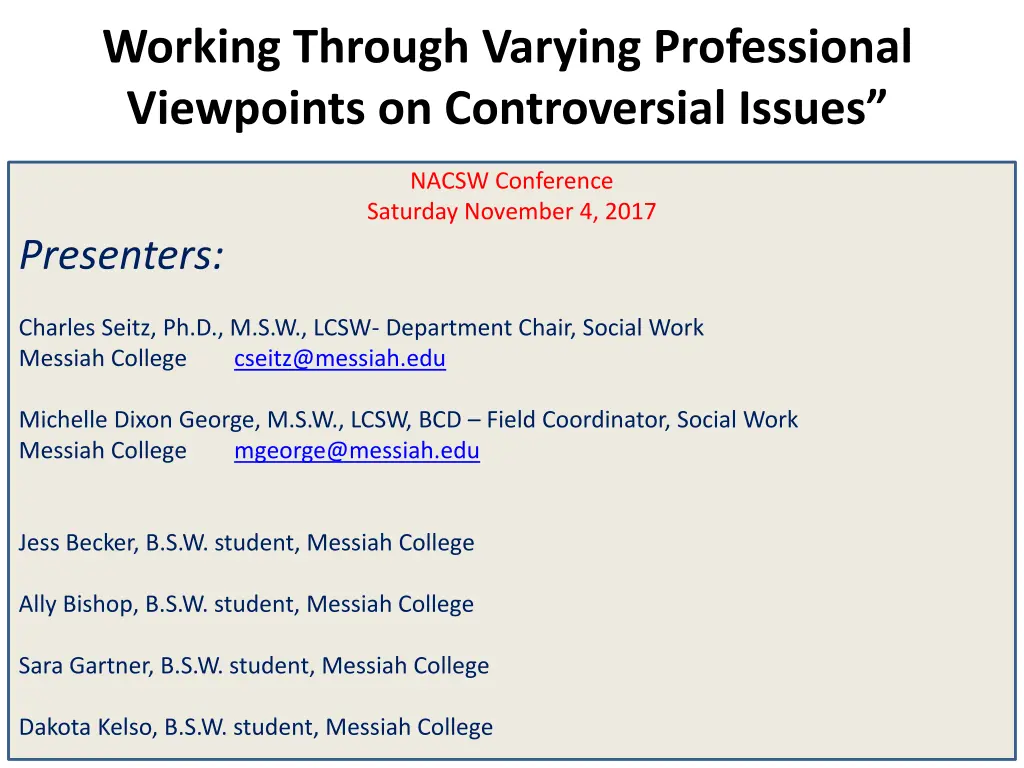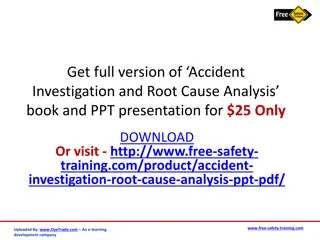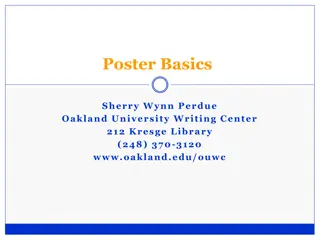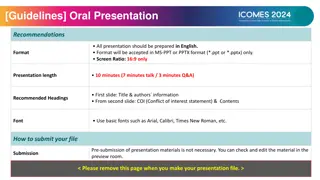
Understanding Varying Viewpoints on Controversial Issues in Social Work
This workshop provides insight into navigating tensions around controversial topics within social work professional organizations. Explore differing perspectives on religion, politics, abortion, infidelity, and LGBTQ issues to find common ground and enhance collaboration in the social work community.
Download Presentation

Please find below an Image/Link to download the presentation.
The content on the website is provided AS IS for your information and personal use only. It may not be sold, licensed, or shared on other websites without obtaining consent from the author. If you encounter any issues during the download, it is possible that the publisher has removed the file from their server.
You are allowed to download the files provided on this website for personal or commercial use, subject to the condition that they are used lawfully. All files are the property of their respective owners.
The content on the website is provided AS IS for your information and personal use only. It may not be sold, licensed, or shared on other websites without obtaining consent from the author.
E N D
Presentation Transcript
Working Through Varying Professional Viewpoints on Controversial Issues NACSW Conference Saturday November 4, 2017 Presenters: Charles Seitz, Ph.D., M.S.W., LCSW- Department Chair, Social Work Messiah College cseitz@messiah.edu Michelle Dixon George, M.S.W., LCSW, BCD Field Coordinator, Social Work Messiah College mgeorge@messiah.edu Jess Becker, B.S.W. student, Messiah College Ally Bishop, B.S.W. student, Messiah College Sara Gartner, B.S.W. student, Messiah College Dakota Kelso, B.S.W. student, Messiah College
Abstract: This discussion based workshop provides a framework for engaging in civil dialogue regarding controversial topics within social work professional organizations. Research related to the plurality of views on various topics will provide a foundation for identifying common ground and for working through the challenges where differences exist.
At the conclusion of this workshop, participants will be able to: 1. Discuss research related to areas of tension within social work professional organizations related to controversial topics including religion, political affiliation, abortion, infidelity and LGBTQ issues. 2. Utilize a framework to articulate commonalities with others presenting differing views and identify areas where a plurality of beliefs creates challenges to working together within the social work professional community. 3. Explore ways to provide a more cohesive social work voice within the larger society and identify a framework where future discussions within social work professional organizations can occur.
Our Goals 1. Understand potential areas of tension related to controversial issues between different social work professional organizations. 2. Identify possible areas of alignment between professional organizations related to controversial issues. 3. Develop a framework where continuing dialog can occur between social workers having differing views on controversial issues.
Background for the presentation This workshop will frame the issue through presenting research that has been conducted that reflects potential differing views within professional social work organizations on controversial issues. The North American Association of Christians in Social Work (NACSW) membership was surveyed to provide insight on the extent of divergent views and to provide a framework for negotiating these challenges. The National Association of Social Workers- PA (NASW-PA) was also surveyed using a similar questionnaire and the data was then compared.
Issues to consider prior to reviewing research data were not assessed for validity/ reliability Survey was primarily intended as a starting point for discussion There is the possibility of overlap in participants (may have been potentially surveyed twice) Cannot specifically compare data between participant groups There was a minor time lapse between surveys Participant perception of survey purpose influenced both whether subjects chose to complete the survey and the actual survey results Qualitative date would need to be collected to achieve more clarity regarding how values and beliefs impact practice Potential issues related to collecting NASW data from only one state (NACSW data was collected nationally). Potential for different data from other NASW state chapters. There is limited research on this topic There are limited instruments available to evaluate topic/ instruments used
Participants During the summer of 2014, in coordination with the NACSW, we conducted a national survey of NACSW (North American Association of Christians in Social Work) members related to how faith informs practice In the Fall of 2014, in coordination with the NASW-PA Chapter, we sent a similar survey to NASW-PA members. It was distributed to members via email. The survey was distributed via email to 978 NACSW members The survey was distributed via email to A minimum of 2,904 members 123 participants completed the survey (12.5%) 213 participants completed the survey (7.3%)
2014 - Fifty-seven percent of Americans say that religion can answer all or most of today's problems, while 30% say that religion is largely old fashioned and out of date. (2016 54% can answer problems/ 33% outdated) http://www.gallup.com/poll/1690/religion.aspx http://www.gallup.com/poll/171998/majority-says-religion-answer-today-problems.aspx
In 2016, 53% of Americans identify religion as very important in own life
What is your religious preference -- are you Protestant, Roman Catholic, Mormon, Jewish, Muslim, another religion or no religion? (2016 Gallop Poll) http://www.gallup.com/poll/1690/religion.aspx What is your religious preference? Protestant 37% Christian, nonspecific 10% Catholic 22% Jewish 3% Mormon 2% another religion 5% no religion? 18% No answer 2%
Which of the following statements comes closest to describing your views about the Bible - 2017 http://www.gallup.com/poll/1690/religion.aspx the Bible is the actual word of God and is to be taken literally, word for word 24% the Bible is the inspired word of God but not everything in it should be taken literally 47% the Bible is an ancient book of fables, legends, history, and moral precepts recorded by man 26%
Demographics Age of Participants (NACSW): 35 or under = 26% 36 to 55 = 37% 56 and older = 36% Age of Participants (NASW- PA): 35 or under = 25% 36 to 55 = 32% 56 and older = 43%
Occupation of respondents Occupation (NACSW): 50% either mental health worker or social work educator Occupation (NASW): 42% either mental health worker or social work educator
NACSW - Please list numerically (rank in order) what you consider to be most important for arriving at a practice decision related to a controversial issue when working with a client. (Start with what you consider to be most important as number 1 to what you consider to be less important as number 10). Top 1st responses Top 2nd responses Top 3rd responses (4th) Professional Code of Ethics 45 50 (5th) Personal Faith Doctrine 40 22 (4th) State or Federal Regulations 15 18 (4th) Agency Policy 16 29 (5th) (5th) Consultation 29 Other possibilities included research, industry standards, personal feelings, past experiences with clients etc.
Which of the following most closely represents your primary view on spirituality? (NASW) I do not view myself as spiritual and my values and beliefs are not connected to a specific religion. 8% I do not view myself as spiritual but my values and beliefs are connected to a specific religion. 3% I view myself as spiritual but my values and beliefs are not connected to a specific religion. 31% I view myself as spiritual and my values and beliefs are connected to a specific religion. 56%
SURVEY QUESTION: This question addresses how you would address sexual relationships of non-married heterosexual adults within treatment situations. 50 45 40 35 30 25 20 15 10 5 0 always mostly seldom never NACSW NASW
NACSW 79% = it is seldom or never morally acceptable for consenting non-married adults to engage in sexual intercourse How strongly does your faith inform your response to the question above? How strongly does your response to the question above impact your practice of social work?
NASW = 71% it is always or mostly always morally acceptable for unmarried heterosexual consenting adults to engage in sexual intercourse - How strongly does your response to the above question impact your practice of social work? How strongly do your values/beliefs inform your response to the above question? 80 60 70 50 60 50 40 40 30 30 20 20 10 10 0 0 Very Strongly Strongly moderately minimally not at all Very Strongly Strongly Moderately Minimally Not at all
SURVEY QUESTION: When you are treating a gay or lesbian couple, which one of the following most closely reflects your response? When you are treating a gay or lesbian couple, which one of the following most closely reflects your response? 160 140 120 100 80 60 40 20 0 It is always morally acceptable to support the gay or lesbian relationship It is mostly morally acceptable to support the gay or lesbian relationship. It is seldom morally acceptable to support the gay or lesbian relationship. It is never morally acceptable to support the gay or lesbian relationship. NACSW NASW
NACSW 53% = it is seldom or never morally acceptable to support the gay or lesbian relationship How strongly does your faith inform your response to the question above? How strongly does your response to the question above impact your practice of social work?
NASW 89% = it is mostly or always morally acceptable to support the gay or lesbian relationship How strongly do your values/beliefs inform your response to the above question? How strongly does your response to the above question impact your practice of social work? 80 120 70 100 60 80 50 40 60 30 40 20 20 10 0 0 Very strongly Strongly Moderately Minimally Not at all Very Strongly Strongly Moderately Minimally Not at all
SURVEY QUESTION Which one of the following most closely reflects your view of immigration policy within the practice of social work? 120 100 80 60 40 20 0 always mostly seldom never NACSW NASW
NACSW 78% = it is mostly or always morally acceptable to advocate toward legal status of undocumented individuals How strongly does your faith inform your response to the question above? How strongly does your response to the question above impact your practice of social work?
NASW 90% = it is mostly or always morally acceptable to advocate toward legal status of undocumented individuals How strongly do your values/beliefs inform your response to the question above? How strongly does your response to the question above impact your practice of social work? 80 60 70 50 60 50 40 40 30 30 20 20 10 10 0 0 very strongly strongly moderately minimally not at all very strongly strongly moderately minimally not at all
Respondent comments (similar comments from both participant groups) Participants concerned about how the survey data would be used, concerned about motives behind survey Participants noted research issues with the survey Several participants wanted opportunity to explain answers Some participants needed clarification on some questions Some issues noted related to the repetitiveness of the questions or question wording Participants appreciated opportunity address issues in both surveys Some participants did not have experience in dealing with some issues in practice situations Many participants wanted to express their own opinions related to how faith, ethics, and/or values impact practice. Many individuals explained their answers (generally how they approached the survey and why they responded the way they did to specific questions)
Questions for Group Discussion 1. What did you find interesting related to the similarities and differences between the two survey groups? What are some possible explanations for similarities/ differences? 2. How could an awareness and understanding of the complexities of the issues (not simplifying) serve to enhance ethical, professional and competent social work practice? 3. How can we recognize and reconcile the differences in a way that best serves the profession and the needs of the individuals and communities served by social workers? 4. What roles can the NASW and the NACSW play in assisting members in navigating these tensions and challenges? 5. What recommendations do you have to continue an understanding related to how faith, beliefs and values impact practice?
References Chamiec-Case, R. (2012). Ethically integrating faith and practice: Exploring how faith makes a difference for Christians in social work. In T. L. Scales & M. S. Kelly (Eds.), Christianity and Social Work: Readings on the integration of Christian faith and social work practice (4th ed.) (pp. 337-359). Botsford, CT: NACSW. Council on Social Work Education. (2008). Education policy and accreditation standards. Retrieved from http://www.cswe.org/File.aspx?id=13780 Dessel, A., Bolen, R., and Shepardson, C. (2011). Can religious expression and sexual orientation affirmation coexists in social work: A critique of Hodge s theoretical, theological, and conceptual frameworks. Journal of Social Work Education, 47(2), 213-234. Gallop. (2017). Religion: Historical trends. Retrieved from http://www.gallup.com/poll/1690/religion.aspx Healy, L. M. (2007). Universalism and cultural relativism in social work ethics. International Social Work, 50(11), 11-26. Hodge, D. R. (2011). Toward a learning environment that supports diversity and difference: A response to Dessel, Bolen and Shepardson. Journal of Social Work Education, 47(2), 235-251 Shepardson. Journal of Social Work Education, 47(2), 235-251. Sherwood, D. A. (2012b). The relationship between beliefs and values in social work practice: Worldviews make a difference. In T. L. Scales & M. S. Kelly (Eds.), Christianity and social work: Readings on the integration of Christian faith and social work practice (4th ed.) (pp. 85-103). Botsford, CT: NACSW. Spano R. & Koenig, T. (2007). What is sacred when personal and professional values collide? Journal of Social Work Values and Ethics, 4(3). retrieved from http://www.socialworker.com/jswve/content/view/69/54/
SURVEY QUESTION Which one of the following most closely reflects your view of pornography as a treatment intervention when working with adults? Which one of the following most closely reflects your rivew of pornography as a treatment intervention when working with adults? 100 90 80 70 60 50 40 30 20 10 0 always mostly seldom never The use of pornogrpahy is always morally acceptable Column1 NACSW NASW
NACSW 97% = it is seldom or never morally acceptable to use pornography as a treatment technique How strongly does your faith inform your response to the question above? How strongly does your response to the question above impact your practice of social work?
NASW 77% = it is seldom or never morally acceptable to use pornography as a treatment technique How strongly do your values/beliefs inform your response to the question above? How strongly does your response to the question above impact your practice of social work? 80 60 70 50 60 50 40 40 30 30 20 20 10 10 0 0 very strongly srongly moderately minimally not at all Very Strongly Strongly Moderately Minimally Not at all
SURVEY QUESTION Which one of the following most closely reflects your view of advocacy within your practice of social work? Which one of the following most closely reflects your view of advocacy within your practice of social work? 160 140 120 100 80 60 40 20 0 It is always morally acceptable to advocate for same sex marriage. It is mostly morally acceptable to advocate for same sex marriage. It is seldom morally acceptable to advocate for same sex marriage. It is never morally acceptable to advocate for same sex marriage. NACSW NASW
NACSW 64% = it is seldom or never morally acceptable to advocate for same sex marriage How strongly does your faith inform your response to the question above? How strongly does your response to the question above impact your practice of social work?
NASW 83% it is mostly or always morally acceptable to advocate for same sex marriage How strongly do your values/beliefs inform your response to the above question? How strongly does your response to the above question impact your practice of social work? 120 80 70 100 60 80 50 60 40 30 40 20 20 10 0 0 Very Strongly Strongly Moderately Minimally Not at all Very Strongly Strongly Moderately Minimally Not at all
SURVEY QUESTION Which one of the following most closely reflects your view of the treatment of transgender individuals? Which one of the following most closely reflects your view of the treatment of transgender individuals? 100 90 80 70 60 50 40 30 20 10 0 It is always morally acceptable to counsel a client to transition from his/her biological sex. It is mostly morally acceptable to counsel a client to transition from his/her biological sex. It is seldom morally acceptable to counsel a client to transition from his/her biological sex. It is never morally acceptable to counsel a client to transition from his/her biological sex. Under 26 NACSW NASW
NACSW 69% = it is seldom or never morally acceptable to counsel to transition from his/her biological sex How strongly does your faith inform your response to the question above? How strongly does your response to the question above impact your practice of social work?
NASW 82% = it is mostly or always morally acceptable to counsel to transition from his/her biological sex How strongly does your response to the above question impact your practice of social work? How strongly do your values/beliefs inform you response to the above question? 70 50 45 60 40 35 50 30 40 25 20 30 15 20 10 5 10 0 Very Strongly Strongly Moderately Minimally Not at all 0 Very Strongly Strongly Moderately Minimally Not at all
SURVEY QUESTION: Which one of the following most closely reflects your view of the issue of abortion? Which one of the following most closely reflects your view of the issue of abortion? 90 80 70 60 50 40 30 20 10 0 It is always morally acceptable to assist a client in obtaining abortion services. It is mostly morally acceptable to assist a client in obtaining abortion services. It is seldom morally acceptable to assist a client in obtaining abortion services. It is never morally acceptable to assist a client in obtaining abortion services. NACSW NASW
NACSW 69% = it is seldom or never morally acceptable to assist a client in obtaining abortion services How strongly does your faith inform your response to the question above? How strongly does your response to the question above impact your practice of social work?
NASW 71% = Always or mostly always morally acceptable to assist clients in obtaining abortion services How strongly do your values/beliefs inform your response to the above question? How strongly does your response to the above question impact your practice of social work? 90 60 80 70 50 60 40 50 30 40 30 20 20 10 10 0 0 Very Strongly Strongly Moderately Minimally Not at all Very Strongly Strongly Moderately Minimally Not at all
SURVEY QUESTION When you are treating a couple who are considering divorce, which one of the following most closely reflects your response? Divorce Counseling 120 100 80 60 40 20 0 Always mostly seldom never NASW NACSW
NACSW 64% = it is seldom or never morally acceptable to counsel toward divorce How strongly does your faith inform your response to the question above? How strongly does your response to the question above impact your practice of social work?
NASW 86% = it is mostly or always morally acceptable to counsel toward divorce How strongly do your values/beliefs inform you response to the question above? How strongly does your response to the question above impact your practice of social work? 50 45 60 40 50 35 40 30 25 30 20 20 15 10 10 0 very strongly strongly moderately minimally not at all 5 0 very strongly strongly moderately minimally not at all






















